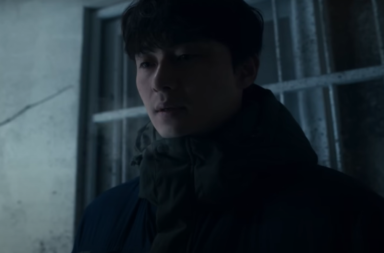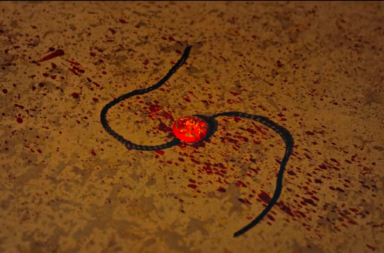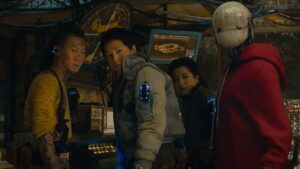
Space Sweepers, a space-action film directed by Jo Sung-hee, recently premiered on Netflix. The story takes place in 2092, when the earth has become almost inhabitable and everyone dreams of being allowed to live on a prospering orbit built by the UTS Corporation. The main cast is a group of working-class “space sweepers” that are stuck in a cycle of poverty as they struggle to raise money for their individual goals. The film consists of common futuristic sci-fi tropes like a dying planet, an AI robot companion, and the use of automatic language translators. Unfortunately, Space Sweepers has a fairly predictable plot and brings nothing new to the space genre. It does try to address bigger concepts of morality and poverty, but does not always get it right. However, the film’s stellar cast, and the lovable Dorothy (Park Ye-rin), brings a lot of warmth and likability to the film that it is still entertaining to watch.
The film depicts the realistic cycle of poverty by showing the daily struggles of space sweepers. These working-class individuals are citizens of Earth who work a dangerous job that requires them to search for space debris in exchange for cash. Tae-ho (Song Joong-ki) has one of the best teams, but somehow they end with even more debt at the end of a working day. Fines, repairs, and other obstacles keep the team from ever reaching their personal goals. The team is obsessed with making money over ethics and does so by even swiping space trash from other space sweepers. While the film touches on this aspect of the working-class, which is an all too real circumstance explored in other films such as Parasite, there is no indication of how this is resolved by the end of the film. However, the team’s dismissiveness of any ethics in a dog-eat-dog society ties back into the main theme.
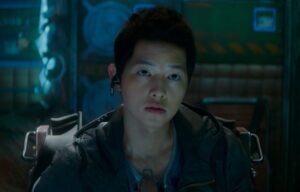
Overall, morality is the center of the film, but it is shown from a privileged point of view. The film suggests that Tae-ho’s focus on money is what led to his distraction and the death of his daughter. However, this also implies a lack of compassion for Tae-ho who was, at the time, living on the streets and starving. Stealing is wrong, but doing so when you are starving opens up a gray area which the film does not address. As Tae-ho struggles with his own principles, this circles back nicely into the ending of the film where he ultimately decides he wants to be a good person. Instead of going after his personal goals, he chooses to be part of the rescue mission to save Dorothy, a young girl they find amidst space wreckage.
James Sullivan (Richard Armitage), the villain of the film, is also inconsistent in how he judges morality. The narrator states that only a minority is chosen to live in the new paradise created by UTS. However, the film fails to clarify how these people are chosen. In a couple of scenes, Sullivan judges one’s morals and how willing they are to look overlook them in order for their own personal gain. However, he simultaneously punishes people for sticking to their own ethics. For instance, Sullivan’s team stripped Tae-ho, a former child soldier, of his title and forced him into poverty for refusing to kill people.
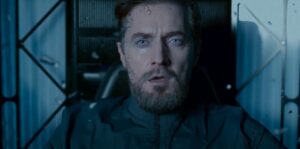
In general, Sullivan is a flat character that the film neglected to round out. Aside from a brief look into his background, not much is known about him. You would think he would have compassion for families being taken away from each other, as his own family was killed. However, he is more obsessed with playing God and judging people based on his own perverted interpretation of righteousness. It is also implied that he has genetically modified his own DNA, having lived to 153 years. Yet, there are moments where he seems to be suffering from some kind of infliction which is never addressed. All in all, the antagonist remains boring, more like a comic-book supervillain, in contrast to the realistic approach the film takes in the backgrounds of other characters.
With all its cons, it may seem like Space Sweepers is not an enjoyable film. However, the chemistry between the main cast members and their own performances bring life into the film. This is especially clear in the characters’ interactions with Dorothy, who is thought to be a life-like android that is set to explode at any moment. Tiger Park (Jin Seon-kyu), a former leader of a drug cartel, quickly takes up a fatherly role. He has some of the most charming scenes with her that shows the audience that Dorothy is not the destructive being she is said to be.

Captain Jang (Kim Tae-ri) and Robot Bubs (Yoo Hae-jin) round out the cast and have equally impressive performances. The team’s leader, Captain Jang, has a similar background to Tae-ho, which explains her no-nonsense attitude throughout the film. Robot Bubs, on the other hand, serves up comic relief and has the wholesome goal of wanting skin grafts to confirm her gender. Together with Tae-ho and Tiger Park, they form an underdog team that everyone can root for as they fight to put an end to Sullivan and his villainous plans to destroy the earth.
In Korea, the film is called The Victory, which better fits the concept of the movie. While they may have all failed at their personal goals, the team sets out on a bigger quest to save the earth and achieving it. Although it does not look into the gray areas of morality, the film still manages to tie it all together for the climax of the film. Combined with a great cast, amazing special effects, and fast-paced action sequences, Space Sweepers is still a decent film for anyone wanting to watch something for the sake of entertainment.
(YouTube. Images via Netflix.)
